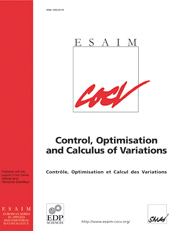Article contents
Controllability of Schrödinger equation with a nonlocal term
Published online by Cambridge University Press: 29 August 2013
Abstract
This paper is concerned with the internal distributed control problem for the 1D Schrödinger equation, i ut(x,t) = −uxx+α(x) u+m(u) u, that arises in quantum semiconductor models. Here m(u) is a non local Hartree–type nonlinearity stemming from the coupling with the 1D Poisson equation, and α(x) is a regular function with linear growth at infinity, including constant electric fields. By means of both the Hilbert Uniqueness Method and the contraction mapping theorem it is shown that for initial and target states belonging to a suitable small neighborhood of the origin, and for distributed controls supported outside of a fixed compact interval, the model equation is controllable. Moreover, it is shown that, for distributed controls with compact support, the exact controllability problem is not possible.
Keywords
- Type
- Research Article
- Information
- ESAIM: Control, Optimisation and Calculus of Variations , Volume 20 , Issue 1 , January 2014 , pp. 23 - 41
- Copyright
- © EDP Sciences, SMAI, 2013
References
- 1
- Cited by




